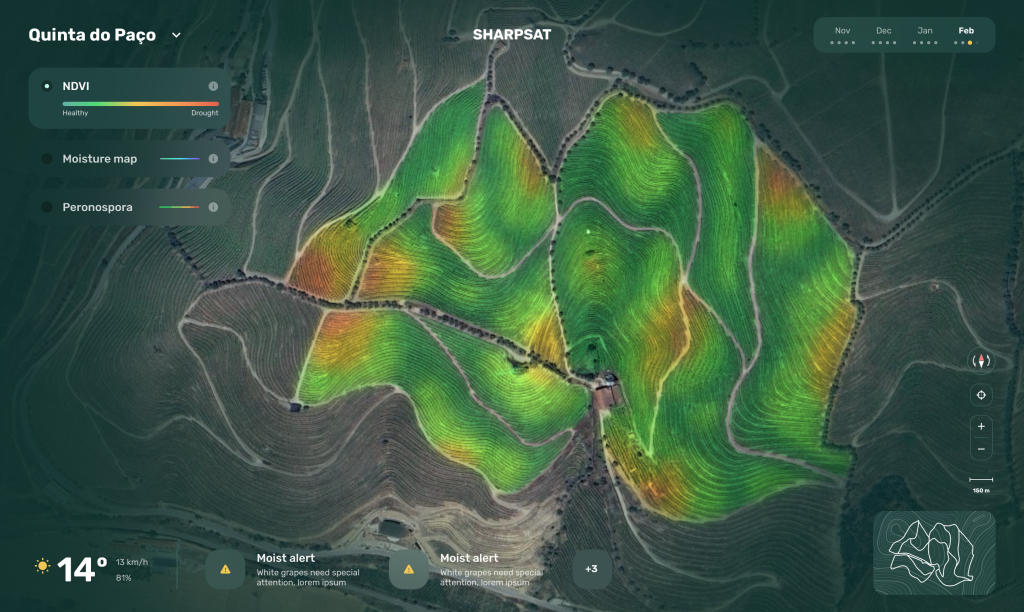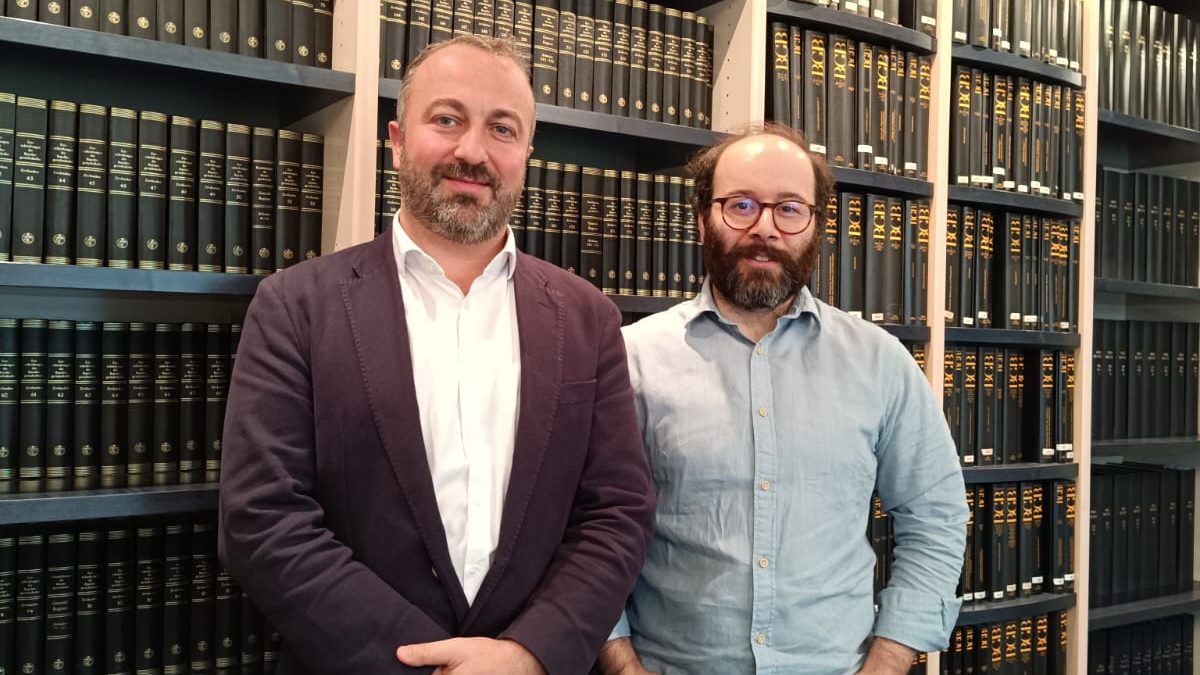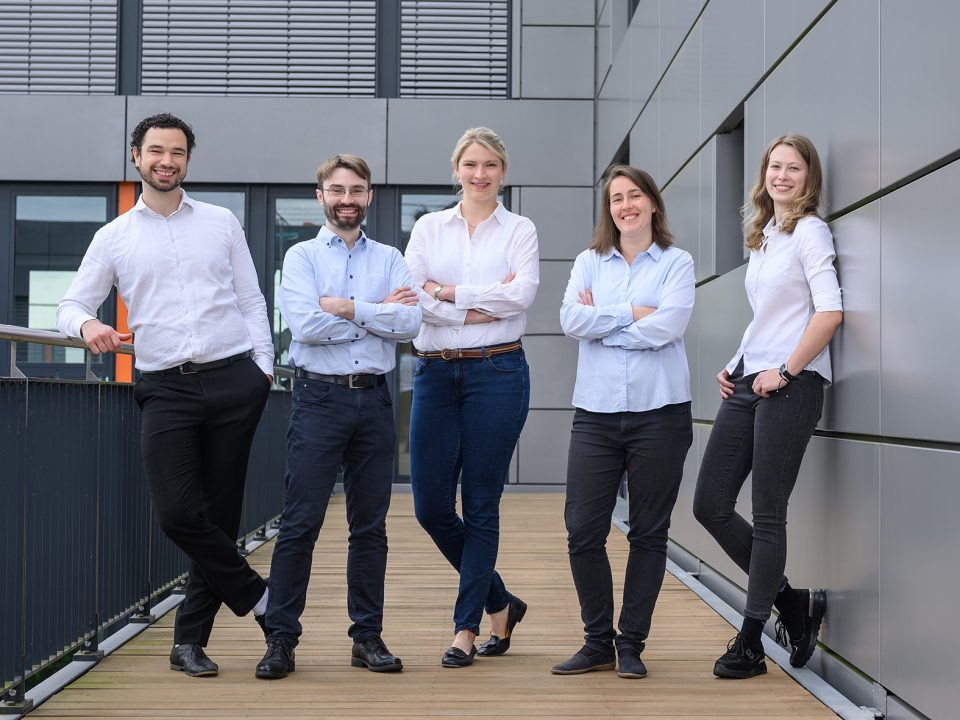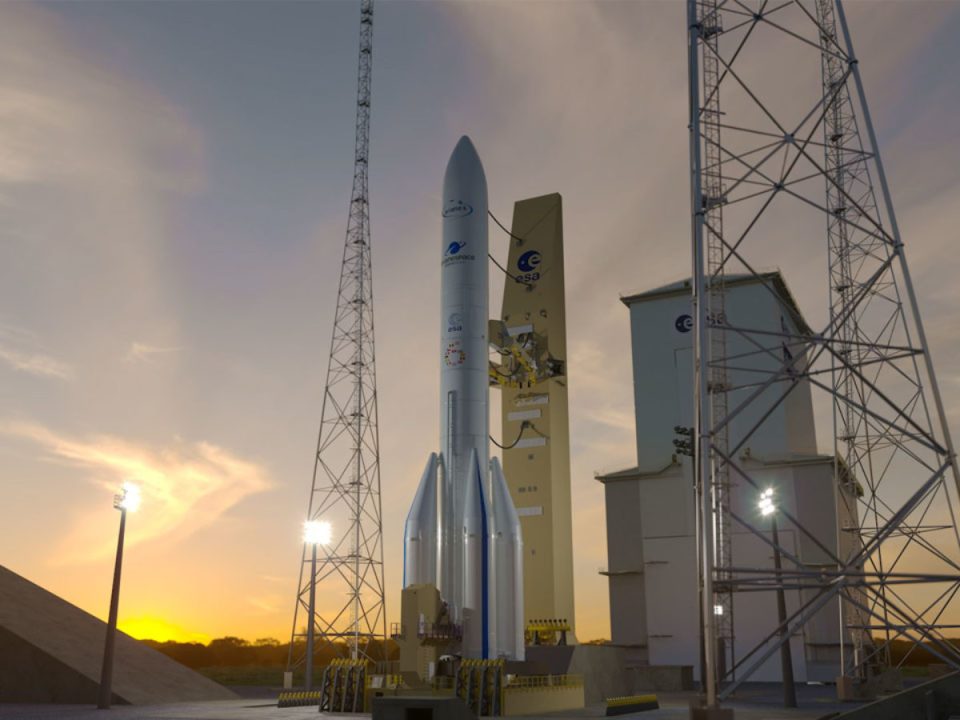
New Members in AVIASPACE BREMEN e.V.: TOOLTIP GmbH and Tecnics Software Engineering GmbH
29.02.2024
BEHIND THE SCENES WITH ARIANE 6 IN FRENCH GUIANA
01.03.2024Amidst the vibrant backdrop of Bremen, a city renowned for its aeronautics and space industry, a new venture is taking root – Sharpsat, an agritech startup headed by the collaborative efforts of Alessandro Esperti and Gustavo Quintela. The two engineers want to transform vineyard management using a combination of Earth Observation (EO) technology and a specially tailored algorithm and interface designed for vineyard farmers. With support from the ESA BIC Northern Germany, this innovative concept has lifted Sharpsat into the orbit of the European startup ecosystem.
Established in December 2023, Sharpsat traces its cultural roots back to co-founders Alessandro and Gustavo, who pitched their innovative idea to the ESA BIC Northern Germany in April of the same year. The surprise discovery of the incubation programme on LinkedIn became the catalyst for melding their space expertise with a familial connection to vineyards. Alessandro and Gustavo, coming from Italy and Portugal respectively, embarked on their venture driven by aspirations to boost their career in the space industry. Both landed at a space systems provider and prime contractor in Bremen, where Alessandro focused on Assembly Integration and Test (AIT) management, while Gustavo contributed to on-board software development. This dual background in space technology, as well as the strategic location in the City of Aerospace, laid the groundwork for their innovative solution, aligning their space expertise with real-world challenges.
Innovation with a Cultural Touch
Cultivating innovation goes beyond technology for co-founders Alessandro and Gustavo; it is rooted in their cultural connection to vineyards. Both coming from regions where vineyards are prevalent, Apulia in Italy for Alessandro and Dao in Portugal for Gustavo, they have an inherent appreciation for the intricate balance required in vineyard management, having many friends and family working in this field.
Their love for wine, particularly their local varieties, Primitivo and Dao wine, adds a personal touch to their venture. Recognising the impact of space applications on various aspects of vineyard management, from monitoring crop health, informing about weather conditions and predicting the spreading of diseases, Alessandro and Gustavo bring a unique perspective to Sharpsat. Their mission extends beyond technological innovation; it’s about enhancing the quality of wine production and promoting sustainable practices in agriculture.
Vineyards as the Launchpad
The first chapter of this orbital journey for Sharpsat is dedicated to vineyards. Leveraging EO technology, the startup aims to provide immediate control and maintenance solutions to ensure the health of grapevines. Their approach allows for proactive disease management, without the widespread use of fungicides and pesticides across entire vineyards, but localises them only where needed, contributing to better quality wine. Additionally, the utilisation of weather prediction aids in informed decisions regarding harvest timing and treatment scheduling adding to the economic viability of growing wine grapes as such.
While EO has been a staple in agritech, Sharpsat’s uniqueness lies in its commitment to offering more detailed information about diseases affecting vineyards specifically, unlike more generic agritech solutions. The feasibility studies currently underway will validate assumptions and test the boundaries of their technology. The development of a specialised algorithm to detect plant diseases and user-friendly web application for farmers are key components of Sharpsat’s journey to enhance grapevine performance. The web application will provide exclusive information about vineyards, offering farmers insights into diseases present and suggesting direct solutions, including specific products that can be used to target and treat the disease.
Alessandro explains, “space technology always needs a use-case for Earth. Every innovation should contribute to addressing real-world challenges. For us, this is a natural evolution of things.”
Global Reach with Local Roots
With Italy, France, Portugal and Germany on their radar, the expansion of Sharpsat mirrors the geographical distribution of vineyards in Europe. Collectively, these countries represent over 80% of their target customers. Acknowledging the need to learn more about agriculture, the co-founders emphasise the symbiotic relationship between space technology and its real-world applications. By focusing on vineyards initially, Sharpsat aims to build a robust foundation and later extend their reach to diverse crops and regions.

A prototype version of the web application currently under development from Sharpsat (©Sharpsat)
Growing Support and Nurturing Partnership
Becoming a part of the ESA BIC Northern Germany has been a milestone for Sharpsat. The business incubator provides essential mentoring, visibility, and credibility. Networking opportunities with partners and fellow startups have proven invaluable for fostering a sense of collaboration and support.
Gustavo highlights the significance of the collaborative spirit of the ESA BIC Northern Germany, “meeting with other startups is really helpful for us – to share ideas, to talk about our experiences as a growing business. We have been able to connect with some of the other startups and it’s clear that we are all dealing with very similar things, and that’s really good to talk about with one another.”
Cultivating Tomorrow’s Harvest
Fuelled by their collective dedication and expertise, Sharpsat will continue to explore the intersections between space technology and agriculture. As they navigate feasibility studies and algorithm development, the co-founders emphasise their commitment to sustainability and the promise of healthier vineyards. The strategic incubation support from ESA BIC Northern Germany propels Sharpsat towards a horizon where cultural heritage and technological innovation converge, promising a future of borderless, sustainable agriculture beyond vineyards.
#SPACEmeetsAGRICULTURE:
Please find out more about Sharpsat on their website.
About ESA BIC Northern Germany
The Incubation Centre of the European Space Agency in Northern Germany (ESA BIC Northern Germany) is headquartered jointly with the Bremen aeronautics and space industries association at the Bremer Innovations- und Technologiezentrum BITZ as well as the Digihub Industry – two of the largest innovation and technology centres for high-tech companies and startups in the German federal state of Bremen. The ESA BIC Northern Germany brings new startup opportunities to the region and thus strengthens the aeronautics and space sector in the German federal state of Bremen. AVIASPACE BREMEN e.V. supports the incubatees with its network, public relations work and targeted coaching not only during the incubation period, but also afterwards as alumni. STARTHAUS Bremen & Bremerhaven s the central point of contact in the Bremen startup ecosystem and supports the startups on all issues relating to business development and financing. The ESA BIC Northern Germany is managed by Anwendungszentrum GmbH Oberpfaffenhofen (AZO), an international networking and branding company for the European space programmes that also manages ESA BIC Bavaria with three locations in southern Germany.
Since 2021, ESA BIC Northern Germany has also been offering its service to space-related startups in Schleswig-Holstein. The Technikzentrum Lübeck with GATEWAY49, AviaSpace Bremen and AZO jointly operate this extension of ESA BIC Northern Germany. There are also plans to extend ESA BIC Northern Germany to the northern German federal states of Hamburg, Lower Saxony, Mecklenburg-Western Pomerania and Berlin-Brandenburg.
Technical support of the ESA BIC Northern Germany, is offered by Fraunhofer IFAM, German Research Center for Artificial Intelligence DFKI, Alfred-Wegener Institute for Polar Research AWI, Bremen University, Center of Applied Space Technology and Microgravity ZARM, Airbus Group, ArianeGroup, AES Aircraft Elektro/Elektronik System, DSI Aerospace, and OHB.







